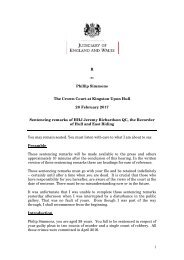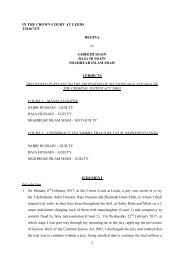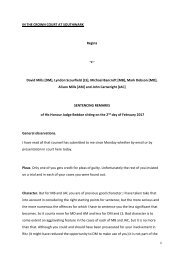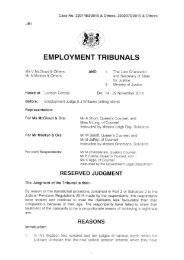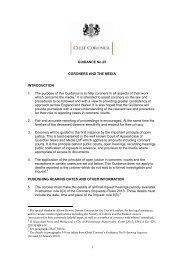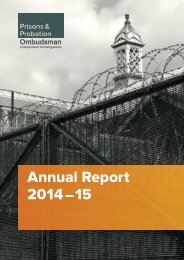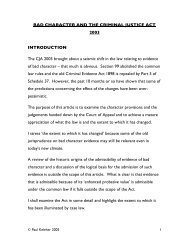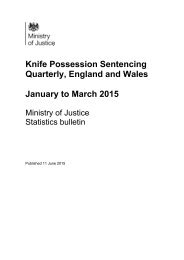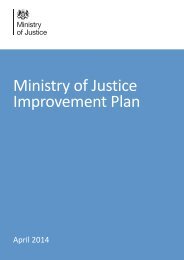HMP Doncaster
Doncaster-web-2015
Doncaster-web-2015
Create successful ePaper yourself
Turn your PDF publications into a flip-book with our unique Google optimized e-Paper software.
Section 2. Respect<br />
2.58 GP appointments were available four days a week, and routine appointments were within an<br />
acceptable timescale. There was no planned GP cover on Thursdays, at weekends or in the<br />
evenings to see new arrivals. Four non-medical prescribers mainly worked during the day;<br />
they routinely covered only one evening and Saturday mornings, which contributed to delays<br />
in new arrivals receiving their medication. Prisoners made health appointments by paper<br />
applications handed to health care staff or through the electronic kiosks (see paragraph 2.7).<br />
2.59 Out-of-hours emergency GP cover was provided to the same level as in the community. The<br />
emergency care practitioner service was available for advice and treatment, and had<br />
sometimes attended to suture wounds.<br />
2.60 The primary care team offered nurse-led clinics, including a specialist pain clinic, minor<br />
ailments and daily triage, although delivery of the triage service had been inconsistent due to<br />
staffing problems. There were limited nurse-led long-term condition clinics, although there<br />
were plans to give staff appropriate training. There were assessment templates reflecting<br />
national clinical guidance but care plans had insufficient detail. Entries in patient records on<br />
SystmOne (the electronic clinical information system) were of a reasonable standard and<br />
regularly audited to ensure a consistent approach.<br />
2.61 An appropriate range of primary care services was available, including physiotherapy, with<br />
acceptable waiting times. A consultant provided a weekly sexual health clinic, and an on-site<br />
X-ray service was available three days a week.<br />
2.62 Prisoner access to external hospital appointments had deteriorated since our last inspection.<br />
This had followed a reduction from four to three in daily allocated slots, an increase in<br />
incidents necessitating emergency care, and lack of custody escort staff. This had led to<br />
prisoners waiting too long for necessary treatment, which was unacceptable.<br />
Recommendations<br />
2.63 Prisoners with lifelong conditions should receive regular reviews from<br />
appropriately trained and supervised staff that generate an evidence-based care<br />
plan.<br />
2.64 There should be adequate escort arrangements for prisoners to attend hospital<br />
appointments, and the health care department and the prison should monitor<br />
external hospital appointments jointly and robustly.<br />
Pharmacy<br />
2.65 Pharmacist-led clinics for prisoner clinical and medicine use reviews were available. The<br />
pharmacist reviewed clinical audits and prescribing data, and attended the bimonthly offender<br />
health drugs and therapeutics committee meetings.<br />
2.66 Medicines were supplied from Well pharmacy as patient-named items with appropriate<br />
labelling and a dispensing audit trail. Emergency stock was adequate and usage was audited.<br />
Medicine was administered up to three times a day at appropriate times. Officers did not<br />
always manage medication queues well, which affected confidentiality and increased the risk<br />
of diversion.<br />
2.67 Medication was supervised for the patient's first month, when they attended a risk<br />
assessment clinic. The medicines in-possession policy was not robustly followed or<br />
documented, and there were inaccuracies in the in-possession status recorded in the<br />
40 <strong>HMP</strong> <strong>Doncaster</strong>



